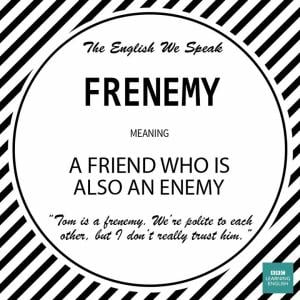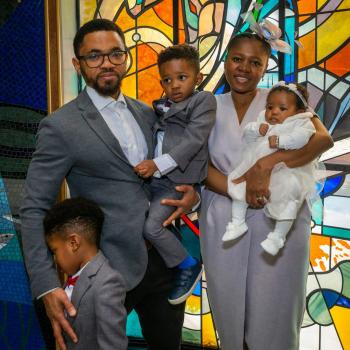Can we disagree on fundamentally important issues, while remaining friends? Can we follow Jesus and still have enemies? What about frenemies?

Now that the US election is over and the inauguration lies on the horizon, many progressive Christians sit in shock. Some are surprised because the American people have dashed their optimistic outlook. Naively, they believed that truth would win out in this election. Basic decency would triumph, they told themselves.
Yet Jesus warned about people’s love growing cold. He said, “…False messiahs and false prophets will appear and produce great signs and wonders, to lead astray, if possible, even ‘the elect’ (quotation marks added).” The Evangelical Church has abandoned its first love and chosen its false messiah. So, what are we to do now? Can these people still remain our friends?
Friends in the Olden Days
In the Olden Days, you had a pretty good understanding of what it meant for a person to be your friend. A friend was someone with whom you shared mutual affection or connection. Perhaps you enjoyed the same interests, came from the same background, or worked toward a common goal. You had school friends, church friends, work friends, and neighbor friends. As time progressed, you developed online friends. You shared a common thread of similar virtue. But then, friendships got more complicated.
Friendships Got Complicated
You’ve heard the old adage that divides friends and enemies into four groups:
1. The friend of my friend is my friend.
You don’t really know this person but feel you can trust them because of a mutual friend. One example is the guy from your friend’s bowling league you meet when helping your friend move. You’ve joined together as allies to support a shared acquaintance.
This is fine—as far as it goes. But this describes allies more than friends. You can set any differences you have aside for the purpose of your one shared goal. Nations and political parties are like that, too. Allies aren’t the same as friends. You don’t need to have the same core beliefs to be strange bedfellows. All you need is to have the same vested interest.
2. The friend of my enemy is my enemy.
You learned this one on the playground. You might not have known the names of the school bully’s cronies. You didn’t need to know them. They had his back, and that’s all you needed to know. If they were helping your enemy, they were hurting you.
3. The enemy of my friend is my enemy.
The corollary is that those same cronies didn’t need to threaten you directly to be your enemy. If they hurt your friends, they were your enemies, too.
4. The enemy of my enemy is my friend.
Say you’re doing a walkathon to raise money for cancer research. Cancer is your enemy. You don’t know any of your fellow walkers, but you’ve joined together to defeat the same foe. Opposition to a common antagonist unites you, even though you don’t know each other.
Confusing Friends with Allies
The problem with this old aphorism is that it confuses friends with allies. Sure, allies can become friends if they hang out together long enough. If they realize they share not only the same goals but also the same values, they can become friends.
But not all allies are friends. You can wear matching team jerseys, share a common political party, or enlist in the same army without being friends. You can have each other’s back, and even die for your allies, without caring about the depths of their souls. Yes, it’s possible to be allies without being friends.
Faith Without Action is Dead
But you can’t be friends without being allies. Once you learn to love the core of another person’s being and consider them your true friend, you can’t look on their need without running to help. James 2:15-17 says:
Suppose a brother or a sister is without clothes and daily food. If one of you says to them, “Go in peace; keep warm and well fed,” but does nothing about their physical needs, what good is it? In the same way, faith by itself, if it is not accompanied by action, is dead.
So, while two people can be allies without being friends, they can’t be friends unless they support one another.
Friendship Without Allyship is Dead
Put another way, friendship without allyship is dead. You can’t claim to be someone’s friend and turn away from their need. That’s just lip service. Neither can you befriend someone who rejects or actively harms your loved ones in need. If they’re your friend, they’ll at least be your friends’ ally. And if they make themselves your friends’ enemies by refusing to help your friend, you can’t remain their friend.
Are Social Media Friends Your Friends?
All this raises the question—are social media friends really your friends? Well, some of them are, and some of them aren’t. Here are seven categories of social media friends:
- Those who are genuine heart-level friends in your everyday 3-dimensional life as well. This is a friend.
- Those who are genuine heart-level friends from your past, but you don’t have 3-dimensional connections with them today. This is still a friend.
- Those who were never heart-level friends, but you share a common history. This is an acquaintance, not a friend.
- Those who exist in your social media feed, but you can’t even recall who they are. You accepted a friend request years ago and can’t for the life of you remember why. These are followers, not friends.
- Those who only exist in your life because of a mutual friend. This is an acquaintance, not a friend.
- Those who were never heart-level friends, but you share a common goal or belief. This is an ally, not a friend.
- Those who were never heart-level friends, but you share a common antagonist. This is an ally, not a friend.
Any of the above, who shifts their attention and allegiance so that they now stand opposed to you and those you love, has left the friend-zone and is now an enemy.
Can We Disagree and Still Be Friends?
When people say, “We can disagree and still be friends,” this is true. In fact, it’s healthy to befriend people of varying backgrounds and perspectives. But when their opinions seek to harm those you love, they can no longer be your friends. They have made themselves the enemies of those you love. Therefore, they have become your enemies as well.
Friendship Means Allyship
For some reason, many Christ-followers believe they have to be friends with everybody. This simply isn’t true. If you befriend those people who try to harm your friends, you betray your friends. If you remain friends with those who turn a blind eye to your friends’ needs, you still betray your friends. Worse, you become your friends’ enemy if you ally yourself with their enemies, for the sake of everybody getting along. Real friendship means choosing a side. And peacemaking doesn’t mean sitting on the fence. If you want to be a real friend, you’re going to have real enemies.
Making Enemies
It’s false to believe that followers of Jesus won’t have any enemies. You can’t hold to the truth without being opposed by those who believe lies. You can’t light a candle without getting cursed by the darkness. In 2 Corinthians 10:5, Paul writes:
“We demolish arguments and every pretension that sets itself up against the knowledge of God, and we take captive every thought to make it obedient to Christ.”
You can’t do this without making enemies. The Prince of Peace, who said, “Blessed are the peacemakers,” also said:
Do not think that I have come to bring peace to the earth; I have not come to bring peace but a sword.
For I have come to set a man against his father,
and a daughter against her mother,
and a daughter-in-law against her mother-in-law,
and one’s foes will be members of one’s own household (Matthew 10:34-36).
Following Jesus means being oppositional. It means joining the resistance. And it means you’re going to have some very powerful opponents. But remember, we do not oppose them through violence. Ephesians 6:12 says:
“For our struggle is not against flesh and blood, but against the rulers, against the authorities, against the powers of this dark world and against the spiritual forces of evil in the heavenly realms.”
The Power of Love
Both Jesus and the author of Ephesians called for nonviolent resistance. Why is our resistance nonviolent? Because we have a different strategy from our enemies who seek to dominate others through the use of earthly powers.
Instead of contending against our enemies bodily, we stand against the prejudices, lies, fears, and manipulations that they propose. And there’s only one way to overcome these things. ‘Not by might nor by power, but by my Spirit,’ says the Lord Almighty. We do this by the power of love.
Loving Your Enemies
Jesus knew that his friends are going to have enemies. But instead of hating them, he told us to love them. In Matthew 5:43-47, Jesus says:
“You have heard that it was said, ‘You shall love your neighbor and hate your enemy.’ But I say to you: Love your enemies and pray for those who persecute you, so that you may be children of your Father in heaven, for he makes his sun rise on the evil and on the good and sends rain on the righteous and on the unrighteous. For if you love those who love you, what reward do you have? Do not even the tax collectors do the same? And if you greet only your brothers and sisters, what more are you doing than others? Do not even the gentiles do the same?

What Does Loving Your Enemies Look Like?
Loving your enemies can look like:
- Refusing to gloat when a healthcare exec is murdered as retribution for the deaths caused by a flawed healthcare system.
- Refraining from social media wars on the platforms of others whose positions you oppose.
- Relating to people on a human level, instead of turning them into an issue or a prop for your debate.
- Reframing your enemies as frenemies, seeing something redeeming in them even if you disagree with them on fundamental issues.
Does Jesus Want Me to Love My Frenemies?
Does Jesus want me to love my frenemies? The short answer is—yes! But the longer answer is loving them doesn’t mean trusting them. It does mean seeking the good of all people, even those with whom you disagree.
Loving your frenemies also means recognizing the differences between acquaintances, friends, and allies. Not everyone who follows you on social media is a friend. Not everyone who goes to church with you or sits on the same committee is an ally. Jesus wants us to love our neighbors—and this means more than simply the others in our subdivision. It means loving even our frenemies.
Love Them, But Don’t Trust Them
Jesus loved his frenemies, but he didn’t trust them. John 2:24 says that
“Jesus on his part would not entrust himself to them, because he knew all people.”
Do you have enemies in your life? The Christian thing is to love them. Work for their good, to turn your enemies into frenemies. And maybe, one day, they can even become friends. But it’s no crime to unfollow Uncle John if his rants on social media cause you emotional unrest. And Jesus lays no burden on his followers to trust those who would do them harm or hurt those they love.
Remember, joining Jesus’s resistance movement means you are going to make some enemies. And there’s no Christian requirement to act like you’re best buddies, just because you play on the same team.














